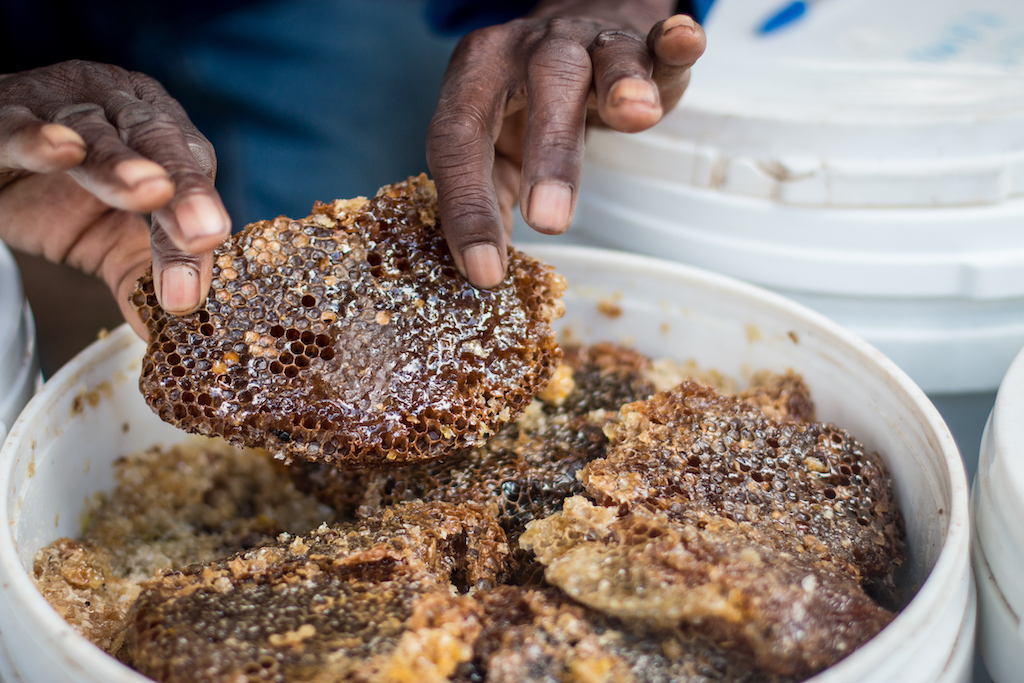Since Mining For Zambia first reported on Nature’s Nectar, a mine-supported startup that is empowering Zambian honey farmers, the sustainable honey producer has gone from strength to strength.
When, in 2018, Nature’s Nectar began introducing sustainable honey farming practices into communities surrounding West Lunga National Park by providing farmers with a different type of hive – and a market for their honey – it was First Quantum Minerals’ (FQM) Trident Foundation that provided the capital for the company to buy their first batch of 2,000 hives.
Protecting the forests near FQM’s Kalumbila operations while facilitating the creation of sustainable livelihoods for locals was a win-win for the Northwestern Province-based mine, which has been investing in conservation initiatives through its Trident Foundation since 2014. In 2019, after Nature’s Nectar had proven itself to be a reliable and impactful livelihood partner, the Trident Foundation invested in another 5,000 beehives. “They were a vital springboard to our growth, helping us to show proof of concept and the fact that there’s a market,” says co-founder Katherine Milling.
Protecting the forests near FQM’s Kalumbila operations while facilitating the creation of sustainable livelihoods for locals was a win-win for the Northwestern Province-based mine.
By distributing top bar beehives (sustainable alternatives to the bark hives that can destroy bee-attracting trees) to the rural farming communities surrounding West Lunga National Park – as well as resettlement areas of the mine – Nature’s Nectar is enabling farmers to produce better, export-quality honey. The company is also the guaranteed sole buyer of all honey coming from these hives, which it then processes and sells, as well as the best-paying honey offtaker in the country.

Securing a new market for Zambian honey
Nature’s Nectar has entered the exciting final negotiation stages with a buyer in the European Union that wants a partner who can commit to a regular supply of high quality honey. “They had procured Zambian honey before, but poor processing led to low quality,” explains Milling. “Sometimes the honey was heated up too much, or it had too much debris. They like our flavour and sustainability profile. Our focus on traceability from hive to bottle is definitely a big differentiator, too.”
While the founders may have secured an avenue for Zambian honey to reach a sizeable new market, they certainly haven’t lost sight of their principles. “Nature’s Nectar was founded with the core belief that we have to create real and measurable impacts. These impacts include a minimum 30% annual income increase for the farmers we work with, protection of one hectare of local forest per hive through our hive distribution model, equal opportunity (a minimum of 50% of the farmers we work with are female), and the protection of the bees themselves through our sustainable harvesting method,” says Milling. That’s exactly what the company intends to continue doing – and they are bringing their fellow Zambian honey producers along with them in this newfound opportunity.
“We are trying to partner with as many sustainable honey producers with good beekeeping initiatives that need a market as possible, and are committed to paying the best price for their products. Really, we’re looking to work with people, instead of having everyone working against each other,” says Milling. “Our real goal is to shift Zambian beekeeping to a sustainable practice. Having a large EU offtaker would be a great opportunity to do that.”
While they await confirmation of the procurement deal, Nature’s Nectar has begun the search for the right production partners. “We’re finding more and more people coming out of the woodwork. The more we go to new events, the more we meet producers who are actually using top bar hives for sustainable beehive production. There are quite a few out there that are doing smaller scale production, but they struggle with processing capacity. If you’re a small producer, you’re not able to reach the export markets because it’s too expensive to export low quantities.”
There is nothing low about the quantities that this new buyer is after. It wants to procure as much as 1,000 tonnes of high quality, sustainably-sourced Zambian honey a year. “To give you some perspective, Zambia as a whole exports approximately 2,000 tonnes a year, with a further 2,000 tonnes being sold locally,” says Milling.
***
Keep an eye out for this article’s sequel, ‘More honey, more money, more jobs’, to find out more about how this partnership is supporting employment in Zambia. (Or simply use the searchable “honey” tag below to discover the whole story any time.)
See also: Like Bees to Honey
























[…] A sweeter future for Zambian honey […]